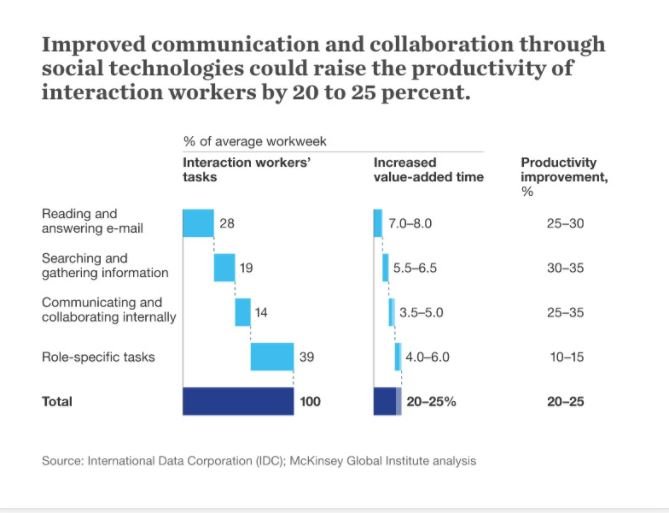Business
How technological innovations are influencing company productivity this decade
Advancements in technology are shaping up the future of companies’ productivity.

Transport a 1950s “Mad Men era” business person to today’s workforce, and they’d be utterly lost amidst the sea of technological innovations influencing company productivity these days.
According to data from the Economic Policy Institute, productivity (as defined by “the output of goods and services per hours worked”) has increased by roughly 74 percent between 1973 and 2013.
Further evidence suggests technology’s impact on this increase. The Economist’s Intelligence Unit, for example, has found that “Employees who believe their workplace effectively uses mobile tech are more creative, satisfied, and productive at work.”
In addition, data gathered by International Data Corporation (IDC) and the McKinsey Global Institute expects productivity gains as high as 20-25 percent among interaction workers, thanks to technological advancements.

© Sujan Patel
So what specific types of technology are driving these productivity gains? And how can businesses leverage them in order to improve their own performance? Let’s explore a few individual technological innovations worth noting:
The facilitation of distributed teams
Gallup reports that “Employees who spend 60% to 80% of their time working remotely are likely to have the highest workplace engagement.”
Not only are remote workers happier, companies that leverage distributed teams can increase productivity by tapping into the appropriate talent, no matter where in the world it’s found.
Facilitating remote work and employing a worldwide workforce are two challenges that have only recently been made possible, thanks to technological innovations like the following:
- Centralized project management platforms that allow real-time, global collaboration that enables team members at all levels – in all locations – to understand at a glance what’s happening with their work.
- Intranet systems provide an appropriate outlet for internal documentation that can be securely stored and accessed by distributed team members.
- Sales collaboration tools help remote workers facilitate the flow of leads from unengaged prospects, to MQLs and, finally, to SQLs—even if they’re located on the other side of the world from the leads themselves.
- Screen sharing, VOIP call lines, and video conference tools make communication possible with distributed team members in all corners of the globe.
Essentially, thanks to today’s technological innovations, a business can happen wherever an internet connection exists – something that would have been inconceivable just a decade or two ago.
Big data insight
More technology means more data – and more data leads to major improvements in productivity.
Take the example of UPS. According to data presented by Repsly’s Amanda McGuinness, UPS was able to use technological innovations to better understand the performance of their trucks, which led to a total reconfiguring of the routes they drove.
McGuinness states:
“In doing this, they cut 85 million miles off daily routes and saved 8 million gallons in fuel. Estimating that a cut in 1 mile per driver saves $30 million, the monetary savings were significant.”
Another example of the data-driven decisions that are made possible thanks to modern technology comes from the ability of retailers to deploy highly-targeted promotional campaigns.
The Romanian retailer Carrefour, for example, was able to use iBeacons in its popular shopping center to increase customer engagement with their app by 400%. That’s thanks to the app’s ability to detect nearby shoppers and target them with personalized messages – thanks to data gathered by the brand.
The applications of big data—especially when businesses’ separate data sources are combined – are extensive, covering territory between and beyond these two examples. It’s likely that every aspect of an organization’s performance – from its sales and marketing success to its operational efficiency—will be touched by the productivity-boosting impact of big data in the coming decade and beyond.
Producing a competitive advantage
In addition to enhancing the performance of an organization’s existing operations, it’s worth noting that technology can, itself, be a compelling competitive advantage that leads to greater productivity.
According to Lumen Learning’s Boundless Management course:
“Empirical evidence generates a positive correlation between technological innovation and economic performance. Between 1981 and 2004, India and China developed a National Innovation System designed to invest heavily in R&D with a particular focus on patents and high-tech and service exports. During this timeframe, both countries experienced extremely high levels of GDP growth.”
In simple terms, when investment in technological innovation exists, economic performance follows. That’s as true for today’s corporate leaders as it is for countries at large, whether it’s the technology itself or the investment in technological innovation that produces a competitive advantage.
The impact of technology on productivity
Fully summarizing the powerful impact technological innovations have had on productivity would require much more exploration than a single article allows for. But it may not be necessary.
If we accept that technological innovation positively impacts productivity, the way forward is clear: investing in new technology (whether by creating it yourself or implementing the innovations of others) is one of the best things you can do for yourself and your company.
Don’t be afraid of new technology. Lean into the opportunities it presents. Your productivity—and your overall performance—will benefit.
—
DISCLAIMER: This article expresses my own ideas and opinions. Any information I have shared are from sources that I believe to be reliable and accurate. I did not receive any financial compensation in writing this post, nor do I own any shares in any company I’ve mentioned. I encourage any reader to do their own diligent research first before making any investment decisions.

-

 Crypto5 days ago
Crypto5 days agoTariff Turmoil Sends Bitcoin and Ethereum Lower as Crypto Markets Face Mounting Pressure
-

 Markets2 weeks ago
Markets2 weeks agoMarkets, Jobs, and Precious Metals Show Volatility Amid Uncertainty
-

 Crypto2 days ago
Crypto2 days agoEthereum Outlook: Key $2,190 Resistance, Whale Accumulation, and Buterin’s Push for True DeFi
-

 Cannabis1 week ago
Cannabis1 week agoAI Can Mimic Psychedelic Experiences but Cannot Truly Feel Them, Study Warns


























You must be logged in to post a comment Login